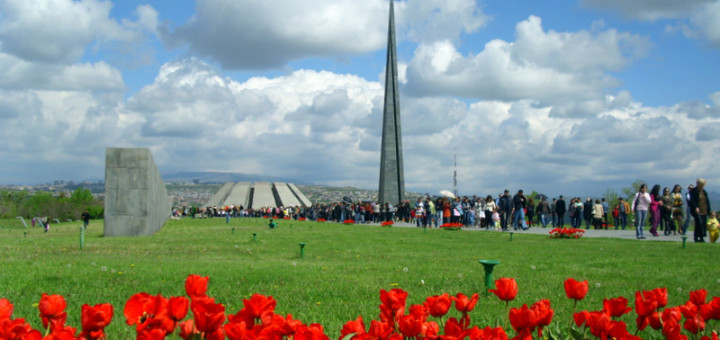Today marks the 103rd anniversary of the beginning of the Armenian Genocide. As is customary, the Armenian communities around the world and in the Republic of Armenia gather to commemorate the extermination of their kin and kith in the Ottoman Empire in which an estimated 1.5 million Armenian Christians perished as the result of the state organized mass murder. Despite the growing body of incontrovertible evidence about this horror, the government of Turkey still continues to deny the fact of the Armenian Genocide, finding refuge in “the sanctuary of steadfast denial,” to borrow from Truman Capote. Denial then takes many shapes, ranging from the minimization of the number of victims to victim blaming. The survivors of the Armenian Genocide and their descendants have had to confront an entire universe of state produced alternative facts before Kelyanne Conway made alternative facts a thing. As the great French philosopher and essayist Michel de Montaigne has put it, “If a lie, like truth, had only one face we could be on better terms, for certainty would be the reverse of what the liar said. But the reverse side of truth has a hundred thousand shapes and no defined limits.”

On April 24 in 1915, hundreds of the Ottoman Empire’s Armenian intellectuals—the leading luminaries of Armenian culture, including professors, doctors, poets, playwrights, composers, and members of the Ottoman parliament—were rounded up and executed shortly thereafter. After these leading voices had been murderously silenced, the Ottoman government of Turkey moved to annihilate its Armenian citizens through a sadistic repertoire of violence that included rape, starvation, death marches, beheadings, public hangings, and mass killings by means and methods so crass and brutal that the butchers of the ISIS would find entirely unobjectionable. Those fortunate enough to survive, like my late grandparents, never fully recovered from the personal damage wrought by the atrocities, which would be later compounded by their own survivors’ guilt. Alongside the destruction of human life, eliminated were also hundreds of Armenian churches, schools, and monasteries – razed to the ground in a carnival of wanton destruction.
Yet Turkey continues to embrace the hydra-headed denial of the Armenian Genocide by funding scholars to rewrite the history of this horrible episode, as well as blackmailing Western governments, and the US government in particular, from officially recognizing the Armenian Genocide. Time and again Turkey has threatened to disengage from lucrative business dealings if these governments make an official recognition of the Genocide. It is a method that has worked in the past. It is time to render it ineffective. It has been wisely observed that the denial of genocide is in fact the final stage of genocide. It can also become the first stage of the next genocide in the making if left unaddressed and without proper redress. Turkey’s current treatment of its Kurdish minority is in a sense connected to the non-punishment of its original crime – the Armenian Genocide. The cycle of crime and non-punishment can be broken if genocides are properly condemned by being properly recognized. This year’s anniversary of the Armenian Genocide, if nothing else, provides the US government the perfect opportunity to break tradition with the usage of “inoffensive” euphemisms and to reclaim, if only partially, the much-squandered moral capital of previous administrations and its own.
Artyom Tonoyan (Ph.D., Baylor University) is Education Program Specialist at the Center for Holocaust and Genocide Studies. He is also a visiting Research Fellow at the Institute of Archaeology and Ethnography, National Academy of Sciences of Armenia. His research interests include sociology of religion, religion and politics in the Caucasus, and the contemporary effects of the Armenian Genocide.

Comments